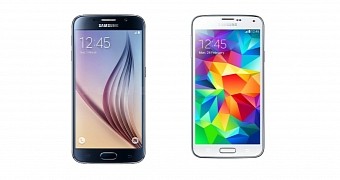Samsung Galaxy S6 has been called the company’s best smartphone effort to date and is considered a much needed improvement over the flop that was the Galaxy S5.
But as it turns out, not everyone agrees on this. For example, the folks at Consumer Reports will pick up a Samsung Galaxy S5 over a Galaxy S6 any day of the week.
The decision seems to be quite puzzling since the Galaxy S6 does come with a premium metal-glass body, a brand new octa-core 64-bit Exynos 7420 under the hood, and a drool-worthy QHD display.
However, Consumer Reports isn't impressed and is focusing on the things the Galaxy S6 doesn't have rather than on the novelties it brings to the table.
The Samsung Galaxy S5 allows users to be more flexible
The publication denounces Samsung’s decision to favor form over function and stresses that a lot of important features have been removed from the Galaxy S6, like the IP67 dust and water-proofing capabilities, the removable battery, and the microSD card slot.
Another important factor for them is battery life, which the Galaxy S6 doesn't excel at (we found the same in our review of the unit). When it comes to maintaining power on board, the Galaxy S5’s juice box does a much better job.
On the other hand, the Galaxy S6 compensates this aspect by bringing Qi rapid charging and Powermat wireless charging into the equation.
The report also says that Samsung has made the Galaxy S6 too similar to the iPhone, both on the inside and on the outside.
Consumer Reports also goes on to mention that the fact that the South Korean company didn’t include a microSD card slot and a removable battery on its latest Galaxy S6 might open the door for other device makers to offer these “missing” functionalities on their devices.
Which is pretty much what the LG G4 did, although consumer interest is not too high when it comes to this particular device model.
Nevertheless, it appears the growing trend in the mobile industry will be for device makers to renounce expandable memory and swappable batteries one by one, as they aim to release the thinnest handsets possible.

 14 DAY TRIAL //
14 DAY TRIAL // 